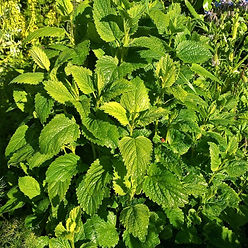Herbs for everyone
Perennial herbs are easy to grow and in many cases have great aesthetic value. Once planted in the garden, they decorate it for many years and are a very important addition to the dishes we prepare. When choosing herbs for your garden, remember that some of them like to grow quickly. Each species has different habitat requirements! Contrary to popular belief, not all of them need to grow in full sun. Get to know a few of them.

Lovage
Lovage root and oil are used in the production of bouillon cubes and popular spices (Maggi-Würze). The stalks can be prepared as asparagus or as celery stalks (salads, vegetable juices). The shredded seeds can be added to bread and other baked goods. You can season soups, sauces and salads with fresh, dried or frozen leaves. Remember, however, that it has a very intense flavor and drowns out other tastes.
Mint
Everyone knows the taste of mint tea. Fresh mint leaves are also great for cocktails and cooling drinks. You can add it to cheese spreads, fruit and vegetable salads, peas with carrots, and even cocoa! You can enrich the taste of jelly and jellies with it. In addition to peppermint, we can also cultivate and use other species in the kitchen, e.g. curly, round-leaved, green, which contains much less menthol (it does not cause a feeling of coldness). By tossing a few mint leaves into a pot of boiling old potatoes - we will improve their taste. If we want the milk not to weigh too quickly - we can add a few mint leaves to it.


Lemon balm
Lemon balm tea is very tasty and can successfully replace tea with lemon. Lemon balm can be seasoned with fruit soups, herbal and mayonnaise sauces, lettuces, rice, pickles, vinegars, mushrooms and eggs. Lemon balm leaves are very delicate, so we should handle them with due care. They can be torn in the fingers or chopped with a ceramic knife. Crushed they lose a lot of essential oils and thus their flavor.
Sage
Sage is most often used as an herbal medicine or tea, but it is also great in the kitchen. It is ideal as an addition to casseroles, omelets, cheese pastes, salads and salads, and its fresh leaves can be added to pickling cucumbers! You can also put them between pieces of vegetables when preparing skewers.


Hyssop
It is mostly used to sharpen the flavor of bland dishes. It is a great addition to potato and bean soup, as well as to cheese, cottage cheese, pizza, potato pancakes, French fries, potatoes, and vegetable pates. Chopped or powdered herb goes perfectly with the taste of salads, as well as with any hard-to-digest dishes made of beans, peas, and cabbage. It enriches the taste of sauces. It is strongly aromatic (bitter taste and balsamic-spicy aroma), so you only need a few leaves!
Common thyme
The common thyme, sometimes also called wild thyme, is a beautiful and popular ornamental plant that has been used in cooking and medicine for years. The herb can be successfully used to season vegetable dishes, as well as salads, sauces, and confectionery. Thyme tea has a great effect on the digestive tract and respiratory system, so it is worth drinking regularly. Thyme stimulates the secretion of gastric juice, improving digestion.

Decorative herb bed

visualization
If you would like an herb bed in your garden but have no idea how to put plants together on it - we have a suggestion for you! See what such a bed can look like (designed by M. Antolak, drawn by J. Mamcarz).
-
Tarragon, estragon (Artemisia dracunculus)
-
Elder ‘Obelisk’ (Sambucus nigra) (eng. elder)
-
Lovage (Levisticum officinale)
-
Mint (Mentha x villona)
-
Lavender (Lavandula angustifolia)
-
Hyssop (Hyssopus officinalis)
-
Common thyme (Thymus vulgaris)
-
Eastern purple coneflower (Echinacea purpurea)
-
Lemon balm (Melissa officinalis)
-
Chives (Allium schoenoprasum)
-
Common sage (Salvia officinalis)
It's a good idea to leave some free space in the bed, which can be planted annually with other species of annual herbs!


Create something special with us!
We are open to cooperation - we conduct a wide range of activities, from creating school gardens, through lectures, workshops, to educational campaigns. We encourage local government units, schools and educational institutions, universities, non-governmental organizations, private persons, companies and the business environment to contact us.




